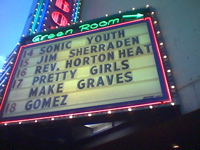
The Sonic Youth show in Seattle on Wednesday night was ear-splitting goodness. The show, which was a last-minute booking after Lollapalooza collapsed, was at the Showbox, across the street from Pike Place Market. The venue is small (“intimate,” I suppose, is the polite word) and lively; it’s the first place I’ve been in a long time that there was honest-to-God moshing, and where people actually remembered how to mosh in a non-destructive way—even lending a hand to take care of a geezer like me who didn’t move quickly enough out of the way.
(This brings me to parenthetical aside #1 about this show. I was smart enough to wear earplugs on the floor, just like Tom, but the complaints coming from my lower back (not new) and my knees (very new) after the show suggest that I may be getting a little old to be going to these clubs. Bear that in mind as you read the rest of the review.)
The set was very different from the 2002 Bumbershoot show. That show was heavy on hits and long, and though they engaged with the crowd they seemed a little above the fray. The Wednesday show drew almost exclusively from their last two albums—Sonic Nurse was played almost in its entirety, and Murray Street was represented by “The Empty Page” and “Rain on Tin”—though there were a couple of crowdpleasers scattered throughout the rest of the set, including a blistering run through “White Cross.” The new material came across largely as it did on the record, alternately intricate (almost REM-jangly in some places) and squalling.
One thing I noticed this go-round is that Jim O’Rourke seems much more a part of the band now. He’s still very much a quiet contributor behind the scenes, but his work on Wednesday was rock solid where two years ago he seemed a little lost in the mix. And his solid foundation, particularly on bass, left room for Kim Gordon to really step up to the mic.
In fact, it was clearly Kim’s show, from the opening vocals on “I Love You Golden Blue” through “Pattern Recognition” (which was really intense) and “Dude Ranch Nurse,” all the way through into “Kool Thing.” Nice start on the latter song, too, with the band hitting the drum and guitar chord that is held prior to starting the massive double guitar chromatic hook, all except for Thurston, who started doing some kind of two-handed fret-tapping free noise that built and built over the chord until Kim yelled something to get his attention and damped the strings with her foot in a move that was almost a spinning side kick. Then the massive double guitar chromatic hook. Since the Yoof now have a whole song on the new album to goof on Mariah Carey (the aforementioned “Mariah Carey and the Arthur Doyle Hand Cream”), the Mariah rant that filled out the middle section in 2002 was replaced with a succinct and pointed W rant.
All in all the show was brilliant—a lean, mean, athletic romp through some really solid new material. The only thing that had the potential to spoil the night, which started with a burger at the Pike Place Market, was almost not being able to retrieve my car from the garage in which I had parked it. I had missed the very small sign that indicated they closed at 1:00. Fortunately, the guy in the booth cut me some slack and let me in at 1:40 to retrieve my car. It would have been a long walk home.


